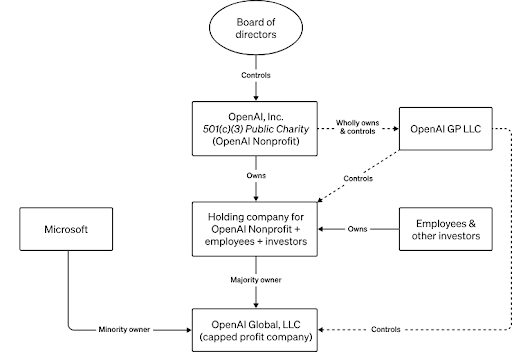The rise, fall and rise of OpenAI’s Sam Altman and what it might mean for the future of responsible business

As the dust settles, not much seems to have changed over at OpenAI, owner of ChatGPT and the world's leading AI developer. There is little to betray the 5 days of chaotic high corporate drama that has gone down - including CEO Sam Altman’s out-of-the-blue firing, the threatened mass walkout of pretty much the entire company and eventual stepping down of two board members to facilitate Altman’s return. It was an explosive breaking news story for the business world - the biggest company pioneering a technology that could either ‘free’ or ‘destroy’ the world (depending on your personal outlook), rocked to its core.
But beyond the breathless coverage of the Succession-like drama, I was more interested in the implications this had for the future of responsible business and if it really can be a force for social good, beyond just the creation of jobs and wealth.
AI’s on the prize
To recap the success of OpenAI to date; Sam Altman, still only 38 years old, has built the company to a valuation of $90 billion in a matter of years through the development of cutting edge artificial intelligence (AI), notably their Large Language Model (LLM) chatbot ChatGPT which launched almost exactly a year ago to widespread fanfare and adoption. By many accounts Altman is one of the good guys - the antithesis of the ego-centric tech entrepreneurs the world has come to know so well.
Since the launch of ChatGPT, AI has become the preeminent pub debate with the arguments going back and forth between those optimistic about its ability to drive innovation, create value and even free us from tyranny of work and those concerned about its potential for entrenching bias and inequality, destroying jobs and even more apocalyptic scenarios involving the end of humanity as we know it. For many, its potential threat has matched, or even overtaken, that of a looming climate breakdown and therefore needs to be carefully considered and controlled.
Curbing the profit motive
What’s interesting, given the company is leading the charge on potentially the most important and lucrative technologies to define the next century, is the way OpenAI was set up and governed. In their own words “while investors typically seek financial returns, we saw a path to aligning their motives with our mission”, that is they felt there was a way to balance the financial requirements of the business with its ethical aims.
Originally set up entirely as a not-for-profit, what this means in practice now is a complicated governance structure that involves a not-for-profit entity and (unpaid) board controlling the for-profit company. The not-for-profit’s “principal beneficiary is humanity” with “fiduciary duties in furtherance of its mission—safe AGI that is broadly beneficial”. The for-profit entity itself also has the amount of profits it could pay back to investors capped (though at a quite high number) with the rest going back to the not-for-profit.

OpenAI’s governance structure; help from AI may be needed to explain it
For some this system felt byzantine, perhaps naive or even a way to purpose-wash what is essentially a money making juggernaut. But it’s hard to deny that these were progressive steps that no other company of its scale and influence were taking. In a world where Elon Musk runs X (formally Twitter) without any board at all, OpenAI’s attempt to marry purpose, funding needs and profit with a strong sense of accountability feels almost as radical as their technology.
Reality bytes
Although we don't have the whole picture, what unravelled over the last week sounds like it was the first real test of that structure. Last Friday the bulk of the board, led by Chief Scientist Ilya Sutskever and supported notably by Tasha McCauley and Helen Toner, an AI safety expert and academic, went to the extreme length of ousting Altman over concerns that he was “too focused on expansion while they wanted to balance that growth with A.I. safety” according to the New York Times.
Fast forward, less than a week and after pressure from employees, investors and a volte-face from Sutskever, Altman is back, with McCauley and Toner expected to step down to be replaced with new, noticeably more commercially minded board members. The hand of OpenAI’s key investor and corporate behemoth Microsoft also looks strengthened with expected oversight of the board and increased influence on its direction.
Business as usual?
For the business press, ‘silicon valley stans’ and techno-optimists it’s the tale of an inexperienced and misguided board who failed to play their role supporting Altman and driving the growth of the company. For others it’s the board staying true to, and doing everything they can to support their fiduciary duty to “benefit humanity” in the face of growing commercial pressure. The battle of profit and purpose writ large, with the former (perhaps inevitably) winning out.
For me, the story is instructive for the future of business. Do we want to live in a world where revered individuals (no matter how amicable), unaccountable to even their board and backed by endless investment in search profit, get to decide the fate of people and the natural world? Or do we want business to recognise its fiduciary duty to people and planet, be well regulated internally and externally by staff, accountable public bodies, scientists and experts and play their part in building a fairer and more sustainable future?
(Re)generative futures
The story isn't yet complete and we’re still in the dark about exactly why the board chose to fire Altman. Maybe the realities will be more nuanced, mundane or petty. Perhaps OpenAI's governance won't end up being as compromised as it currently seems. But for those of us worried about the future and desperately wanting business to meaningfully step up, be it on AI, climate or a host of other issues, you could forgive us for feeling slightly less optimistic about their ability to do so.
Hope remains out there if you look for it. Doughnut economics and regenerative design provide new frameworks for companies to understand their impact and innovate around it. Businesses are going further than just recognising their duty to the natural world by giving nature a seat on the board. Externally a revitalised US Federal Trade Commission is taking the antitrust fight to whole sectors that have become monopolised like search and online retail. And unions have discovered newfound strength as their numbers swell and they celebrate victories across the globe. The solutions, old and new, for a brave new world of business are in our hands.
[Header image generated using OpenAI-owned DALL.E (obviously)]
